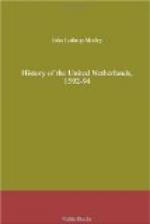The League issued a formal and furious invective in answer to Henry’s announcement; proving by copious citations from Jeremiah, St. Epiphany; St. Jerome, St. Cyprian, and St. Bernard, that it was easier for a leopard to change his spots or for a blackamoor to be washed white; than for a heretic to be converted, and that the king was thinking rather of the crown of France than of a heavenly crown, in his approaching conversion—an opinion which there were few to gainsay.
And the Duke of Nemours wrote to his half-brother, the Duke of Mayenne; offering to use all his influence to bring about Mayenne’s election as king on condition that if these efforts failed, Mayenne should do his best to procure the election of Nemours.
And the Parliament of Paris formally and prospectively proclaimed any election of a foreigner null and void, and sent deputies to Mayenne urging him never to consent to the election of the Infanta.
What help, said they, can the League expect from the old and broken Philip; from a king who in thirty years has not been able, with all the resources of his kingdoms, to subdue the revolted provinces of the Netherlands? How can he hope to conquer France? Pay no further heed to the legate, they said, who is laughing in his sleeve at the miseries and distractions of our country. So spake the deputies of the League-Parliament to the great captain of the League, the Duke of Mayenne. It was obvious that the “great and holy confederacy” was becoming less confident of its invincibility. Madame League was suddenly grown decrepit in the eyes of her adorers.
Mayenne was angry at the action of the Parliament, and vehemently swore that he would annul their decree. Parliament met his threats with dignity, and resolved to stand by the decree, even if they all died in their places.
At the same time the Duke of Feria suddenly produced in full assembly of Leaguers a written order from Philip that the Duke of Guise and the Infanta should at once be elected king and queen. Taken by surprise, Mayenne dissembled his rage in masterly-fashion, promised Feria to support the election, and at once began to higgle for conditions. He stipulated that he should have for himself the governments of Champagne, Burgundy, and La Brie, and that they should be hereditary in his family: He furthermore demanded that Guise should cede to him the principality of Joinville, and that they should pay him on the spot in hard money two hundred thousand crowns in gold, six hundred thousand more in different payments, together with an annual payment of fifty thousand crowns.




